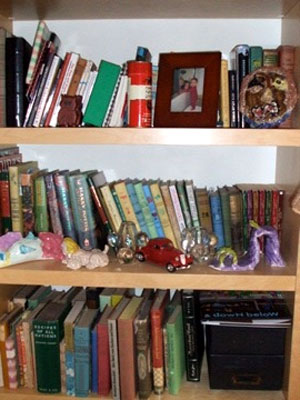All Nonfiction
- Bullying
- Books
- Academic
- Author Interviews
- Celebrity interviews
- College Articles
- College Essays
- Educator of the Year
- Heroes
- Interviews
- Memoir
- Personal Experience
- Sports
- Travel & Culture
All Opinions
- Bullying
- Current Events / Politics
- Discrimination
- Drugs / Alcohol / Smoking
- Entertainment / Celebrities
- Environment
- Love / Relationships
- Movies / Music / TV
- Pop Culture / Trends
- School / College
- Social Issues / Civics
- Spirituality / Religion
- Sports / Hobbies
All Hot Topics
- Bullying
- Community Service
- Environment
- Health
- Letters to the Editor
- Pride & Prejudice
- What Matters
- Back
Summer Guide
- Program Links
- Program Reviews
- Back
College Guide
- College Links
- College Reviews
- College Essays
- College Articles
- Back
Junie B. Jones, A Banned Book?
Junie B. Jones, A Banned Book?
Junie B. Jones, a series of children's books authored by Barbara Park, is challenged and banned by people all around the nation because of the reviews and criticism the books received. It may be hard to believe, but many concerned teachers and parents protest the series because of its use of bad grammar and language, the decisions Junie B. Jones makes, and some of the messages the books send. Barbara Park even showed up on the American Library Association's list of ten most frequently challenged authors of 2004 due to these kind of opinions. Being a seemingly innocent set of novels, one would probably never guess that books like this would be banned by local and state school systems around the country, but unfortunately, it's still excluded from many libraries. Even in homes, people decide against letting their kid read Barbara Park's books because they find the books too inappropriate, even though they are oriented towards the younger crowd.
Despite what one might think, some people don't consider the Junie B. Jones books beneficial or educational to their children's literary experience for many reasons. Pointed out by Julie from Before It's News, Junie B. Jones has been challenged because the books teach poor social values and because Junie B. Jones is a mouthy brat!" It's clear here that adults didn't want to let their children be exposed to such a book. Hinting at keeping books in the libraries, the author later added that, “If parents feel their own children shouldn't read them, they should make house rules... They shouldn't ban them from libraries..." Many of the complaints and issues were of parents having bad experiences with the books, which they chose to complain about to the writer of the books as well as their communities.
One of the protested points of the series is Junie's use of grammar and language. “...people say Park's character uses words like “stupid” and “dumb” and takes liberties with traditional spelling.” Adults don't want their kids picking up bad vocabulary or speech patterns from a book like Junie B., but, as Jill Ratzan, author of the article Junie B. Jones, Language, and Linguistics, states “any complaints... focus on Junie B.'s use of nonstandard English. But the knee-jerk objection is the only one way of viewing the unusual grammar and vocabulary that characterize this series.” What Jill Ratzan is trying to say here is that Park's intent was to add in grammatical errors and mistakes to give insight into the life of an elementary schooler, rather than to mislead readers. Wouldn't the whole point in writing from a young girl's point of view like that be to demonstrate what being a child is like?
Another challenged aspect of the Junie B. Jones series is her decisions and actions. “Junie B. is always getting into big trouble, and rarely makes the right choices, but in the end everything works out and there's usually a lesson to learn.” By adding dimension to Junie, Barbara Park truly shows off the curious and flamboyant personality of a seven year old. Of course seven year olds make a lot of poor choices in books, but these aren't meant to encourage the audience to do that or to scare the readers off.
Finally, and probably most important, are the themes and messages coming from the books. Almost the entire book is built around what the reader is supposed to get out of the story and apply to real life, which, in the case of Junie B., is supposed to be about a young girl going through the same things that everyday kids go through, and that she learns from her mistakes. Despite this, readers and their parents are getting something quite different. Quoting a curriculum from New Jersey, an article from CiteULike by Megan Schliesman gave input, “It sends the message that... emotions such as hate are fine.” Park most likely did not want to have readers thinking this, and the person who wrote this may have taken the entire theme out of context, which could blur the story's true message.
As one would be able to see, even a mild and well-intentioned children's series like Junie B. Jones can be challenged and banned. It seems that something said or done in the books could be brought out of context or over exaggerated and ruin the excitement and fun of the story. The saying “the squeaky wheel gets the grease” could apply to how the negative reviews and limiting criticism can override the large amount of positive feedback about what good the book actually does, corner a book and get it removed from a school reading list or a child's bookshelf. Park's intent, by writing to a young and family-oriented community, was probably to educate kids by writing a fun piece of literature for all to enjoy, but for some, the negative connotations can overshadow this.

Similar Articles
JOIN THE DISCUSSION
This article has 3 comments.